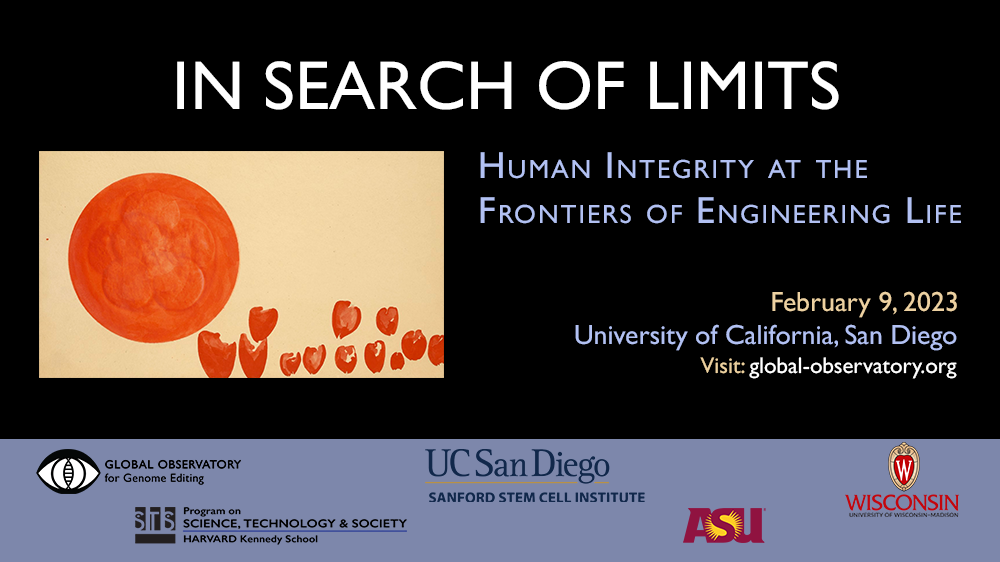In Search of Limits in the Age of Genome Editing: Human Integrity at the Frontiers of Engineering Life

This workshop, the second in a series (the first took place in 2022), explored the narratives of promise, purpose, and perfectibility that animate frontiers developments in biotechnology. These narratives have circulated widely around technologies that intervene in human development in the name of doing nature better. Examples include genome-edited babies, stem cell-derived synthetic embryos, and human neuronal systems grown in vitro. Those leading these strides in bioengineering are often aware of a need to question and if possible, reaffirm the nature of and moral justification for limits on scientific research and intervention. Recent years have seen the emergence of a global patchwork of laws, policies, recommendations, proposals, conventions, and declarations that respond to these concerns by defining and delimiting the field of permissible research that intervenes in human development and reproduction.
These Observatory workshops seek to illuminate the junctures at which scientific communities and their interlocutors in society do, or do not, engage with questions of limits: limits on what knowledge should be pursued, through what means, and how such knowledge should be translated into technological applications; limits on the range of ethical questions that should be asked, the scope of deliberation, and extent of participation within and beyond science; and limits on the forms of reasoning, evidence, and expertise that inform democratic deliberation and decisions on governance.
How has the need for new limits been understood and approached in emerging research domains where codes of ethical conduct are not yet in place? How are expressions of ambivalence or disagreement about what research should or should not be done accommodated? What institutions, if any, do scientists see as serving their need for guidance or oversight in uncharted territories? What role are universities and professional bodies playing in addressing the demand for limits in a changing landscape? To what extent do institutional design choices and the framing of questions for debate reflect national traditions of expert or democratic deliberation?
Given the complexity of the ethical landscape and the variety of processes at work in setting limits, these workshops are designed to think systematically about how limits to biotechnologies at the frontiers of human life are being defined and to identify salient issues and positions that may be receiving less attention than deserved. This workshop, therefore, sought to further the Global Observatory’s mission of broadening the present scope of deliberation, centering not just on the limits themselves, but also on the processes that institutionalize them, the voices that contribute to them, the human values that animate them, and the forces that may push back against them.
Opening Lecture, 9:30-10:45 am PST
Jacob Hanna, Weizmann Institute of Science
"Synthetic Ex Utero Embryogenesis: From Naive Pluripotent Stem Cells to Bona Fide Embryo Models"
Panel 1: Limits of Research, 11 am-12:30 pm PST
|
Alysson Muotri, University of California, San Diego Matthew Porteus, Stanford University Jacob Hanna, Weizmann Institute of Science |
Introductory remarks: Sheila Jasanoff, Harvard Kennedy School Moderator: J. Benjamin Hurlbut, Arizona State University |
Panel 2: Cosmopolitan Ethics in Public Deliberation, 1:30-3 pm PST
|
Rosemarie Garland-Thomson, Emory University Reuven Brandt, University of California, San Diego J. Benjamin Hurlbut, Arizona State University |
Moderator: Krishanu Saha, University of Wisconsin-Madison |
Panel 3: Limits of Public Governance, 3:30-5 pm PST
|
Keynote: Carrie Wolinetz, NIH Maria Millan, CIRM Sheila Jasanoff, Harvard Kennedy School Derek Thompson, The Atlantic |
Moderator: Andy Murray, Harvard Kennedy School |